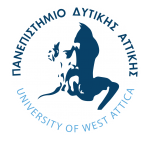Course info:
Semester: 1
General Foundation
ECTS: 6
Hours per week: 4
Professor: T.B.D.
Teaching style: Classroom lectures and tutorials
Grading: 100% final exam
| Activity | Workload |
|---|---|
| Lectures | 26 |
| Tutorials | 26 |
| Essays | 38 |
| Student’s study | 60 |
| Course total | 150 |
Learning Results
Purpose of the course: The development of basic concepts of Mathematical Analysis that apply to many scientific disciplines and in particular to informatics and computer engineering.
Aim of the course: At the completion of the course the students should be capable of understanding the basic concepts of Mathematical Analysis. They should have gained the related techniques that will allow him to deal successfully with application problems. At the end of the course the students should know the fundamentals of derivatives and differentiation, integration of functions, functions of many variables, double and triple integrals. A special focus will apply on the theory complex numbers. The knowledge offered in the course is fundamental to the demands of other courses. The aim of the course will be achieved through selected exercises and optional projects that will be offered to the students during the semester.
Skills acquired
- Research, analysis and synthesis of information
- Adapting to new conditions
- Decision making
- Autonomous work
- Production of new ideas
- Differential calculus; functions of one variable. Limits, derivatives, graph and study of functions.
- Integrals. Definite integral, indefinite integral. Integration techniques.
- Series; Convergence criteria, power series, Taylor and MacLaurin series
- Differential equations; first degree differential equations, linear differential equations with constant coefficients, systems of linear equations.
- Functions of many variables; Partial derivatives, critical points of functions. Double and Triple integrals.
- Complex numbers: Definition and fundamental properties, trigonometric form, Euler’s formula, exponential form.
- William Trench, Introduction to Real Analysis, Free Hyperlinked Edition 2.04 December 2013
http://ramanujan.math.trinity.edu/wtrench/texts/TRENCH_REAL_ANALYSIS.PDF - Jirí Lebl, Basic Analysis I, Creative Commons Attribution-Noncommercial-Share Alike 4.0 International License and the Creative Commons Attribution-Share Alike 4.0 International License (2021) https://www.jirka.org/ra/realanal.pdf
- J.H. Heinbockel, Introduction to Calculus (2012), free ebook http://www.math.odu.edu/~jhh/Volume-1.PDF
- Learning Results - Skills acquired
-
Learning Results
Purpose of the course: The development of basic concepts of Mathematical Analysis that apply to many scientific disciplines and in particular to informatics and computer engineering.
Aim of the course: At the completion of the course the students should be capable of understanding the basic concepts of Mathematical Analysis. They should have gained the related techniques that will allow him to deal successfully with application problems. At the end of the course the students should know the fundamentals of derivatives and differentiation, integration of functions, functions of many variables, double and triple integrals. A special focus will apply on the theory complex numbers. The knowledge offered in the course is fundamental to the demands of other courses. The aim of the course will be achieved through selected exercises and optional projects that will be offered to the students during the semester.
Skills acquired
- Research, analysis and synthesis of information
- Adapting to new conditions
- Decision making
- Autonomous work
- Production of new ideas
- Course content
-
- Differential calculus; functions of one variable. Limits, derivatives, graph and study of functions.
- Integrals. Definite integral, indefinite integral. Integration techniques.
- Series; Convergence criteria, power series, Taylor and MacLaurin series
- Differential equations; first degree differential equations, linear differential equations with constant coefficients, systems of linear equations.
- Functions of many variables; Partial derivatives, critical points of functions. Double and Triple integrals.
- Complex numbers: Definition and fundamental properties, trigonometric form, Euler’s formula, exponential form.
- Recommended bibliography
-
- William Trench, Introduction to Real Analysis, Free Hyperlinked Edition 2.04 December 2013
http://ramanujan.math.trinity.edu/wtrench/texts/TRENCH_REAL_ANALYSIS.PDF - Jirí Lebl, Basic Analysis I, Creative Commons Attribution-Noncommercial-Share Alike 4.0 International License and the Creative Commons Attribution-Share Alike 4.0 International License (2021) https://www.jirka.org/ra/realanal.pdf
- J.H. Heinbockel, Introduction to Calculus (2012), free ebook http://www.math.odu.edu/~jhh/Volume-1.PDF
- William Trench, Introduction to Real Analysis, Free Hyperlinked Edition 2.04 December 2013
